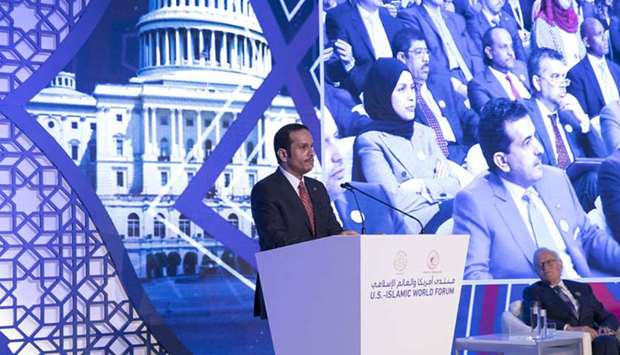In the keynote speech at the US-Islamic World Forum, which opened in New York, he underscored the importance of addressing conflicts and political and ideological divisions in the international community.
Sheikh Mohamed said under the current “conditions and challenges,” the global community has witnessed "increased political division and ideologies,” which, he said, “has led to instability in different parts of the world.”
Various unresolved issues are rife despite the issuance of several UN resolutions. “This shows that we should implement these resolutions and stop double standards, and we have to spread the culture of understanding and coexistence,” he said.
______________________________
*Sheikh Mohamed's call to reinforce co-operation among nations through direct and honest dialogue on the basis of mutual respect
*'The desire to achieve peace represents the aspirations of all peoples of the world'
______________________________
“We cannot call the situation of occupation and oppression as coexistence. We believe that common interest between Arab nations and the US require that we have to deepen and protect relations, and to reinforce co-operation through direct and honest dialogue on the basis of mutual respect, which constitute as a basis for relations among world countries,” he continued.
Sheikh Mohamed stressed that Qatar is continuously consolidating dialogue and promoting co-existence between different religions and cultures, citing the establishment of the Doha Centre for Interfaith Dialogue, and events like the annual Doha Forum, as well as other conferences and meetings.
“And the continuation of holding this forum is a clear evidence of this,” he stressed, while recalling that the forum was first organised in 2002 as the ‘Doha Conference on US Relations with the Arab and Islamic World’ as part of global efforts to address the repercussions of the 9/11 terrorist attacks in 2001.
“We have to build bridges to achieve harmony between cultures. Recently, we have witnessed increased bigotry of religion and the use of selective agenda for political ends. Religion has nothing to do with terrorism but extremists work to spread the discourse of bigotry and isolation to exist in different countries and societies, and they belong to different religions."
Asserting that “the majority of religious people are against terrorism,” Sheikh Mohamed reminded that while “confronting terrorism, we have to remember that terrorism is not a popular phenomenon. There are some social, ideological, and political reasons for the emergence of terrorism.
“There is no doubt that the relations between the US and Muslim nations can influence this and can be influenced by this, hence there is a need for the international community to channel these communications and forum of discourse like this one to build bridges and enhance co-operation between peoples and to good results. In this way, we can stand against those who incite terrorism on both sides,” he stressed.
Sheikh Mohamed said the desire to achieve peace “represents the aspirations of all peoples of the world.” Citing the issues besieging Palestine and other conflicts in the Middle East, the foreign minister said “the distinguished” relations between the US and the Islamic world is confronted with challenges like the “continued failure to achieve peace because of selective policies in the implementation of international legitimacy resolutions and double standards.”
Under the administration of US President Donald Trump, the minister expressed hope that “peace would be achieved in the Middle East.” He also praised the US for its efforts to resume “serious negotiations” to settle the war in Palestine.

HE the Foreign Minister Sheikh Mohamed bin Abdulrahman al-Thani delivers the keynote speech at the US-Islamic World Forum
Reiterating Qatar's stance on terrorism, HE the Foreign Minister Sheikh Mohamed bin Abdulrahman al-Thani declared on Sunday that the state believes in the “absolute rejection of all forms of fanaticism and extremism.”

